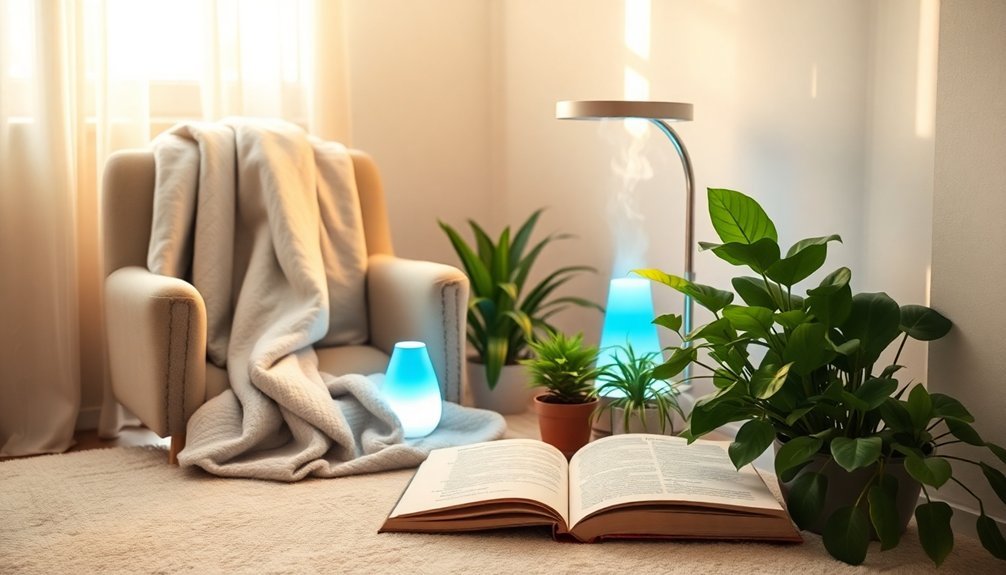Natural therapy treatments can effectively support your glaucoma management alongside prescribed medications. You'll benefit from antioxidant-rich foods like leafy greens and citrus fruits, which can reduce glaucoma risk by up to 30%. Regular low-impact exercise helps lower intraocular pressure, while herbal supplements like ginkgo biloba and bilberry extract may improve ocular blood flow. Proper sleep position with an elevated head can decrease eye pressure by 20%. Lifestyle modifications, including stress reduction and proper hydration, play essential roles in eye health maintenance. Discover how combining these natural approaches can enhance your overall glaucoma treatment strategy.
Understanding Glaucoma Natural Remedies

Natural remedies for glaucoma encompass a wide range of dietary changes, herbal supplements, and alternative therapies that may complement traditional medical treatments. While these remedies can't cure glaucoma, they might help support your overall eye health and potentially slow disease progression when used alongside prescribed medications.
You'll find several promising natural options to think about. Antioxidant-rich foods, particularly leafy greens like spinach and kale, can provide essential nutrients for eye health. Regular exercise sessions have been shown to help lower intraocular pressure for several months.
You can boost your antioxidant intake through cranberries, black and green teas, and pomegranates.
Omega-3 fatty acids may help reduce inflammation that contributes to glaucoma symptoms.
Some herbal supplements, such as ginkgo biloba and bilberry extract, show potential benefits for ocular blood flow and retinal health. However, you should approach these options with caution.
They aren't clinically proven treatments, and some can interact with medications or cause side effects. Before starting any natural remedy regimen, it's vital to consult your healthcare provider.
They'll help you understand potential risks and make certain your chosen supplements won't interfere with your prescribed glaucoma treatments.
Herbal Supplements for Eye Health
Building on our exploration of natural remedies, specific herbal supplements stand out for their potential benefits to eye health. Bilberry extract, rich in anthocyanins, can protect your eyes from oxidative damage and support night vision while helping reduce eye strain from screen exposure. Current research shows that once-daily softgels can provide consistent delivery of these beneficial compounds.
You'll find powerful antioxidants like lutein and zeaxanthin particularly beneficial, as they filter harmful light and protect against oxidative stress. These compounds, naturally present in leafy greens, concentrate in your retina and can improve visual performance when taken as supplements.
Traditional herbs like eyebright and ginkgo biloba offer additional support. While eyebright may help with eye strain, ginkgo biloba enhances blood circulation to your retina and provides protective effects for retinal cells.
These herbs work together to support overall eye tissue health.
Don't overlook the importance of omega-3 fatty acids and vitamin A in your eye health routine. Omega-3s, particularly DHA and EPA, support retinal health and help address dry eye conditions.
Vitamin A plays a vital role in maintaining vision, especially in low-light conditions, and helps prevent night blindness and other eye-related issues.
Traditional Chinese Medicine Approaches

Through centuries of practice, Traditional Chinese Medicine (TCM) has developed sophisticated approaches to treating glaucoma by focusing on the balance between yin and yang energies.
When treating glaucoma, TCM practitioners target the liver and kidney systems, which they believe play essential roles in eye health. You'll find that TCM's approach involves using specific herbal formulations like Liu Wei Di Huang Tang and Qi Ju Di Huang Tang to nourish yin and manage intraocular pressure. Emotional factors like ongoing anger and frustration can contribute to liver fire affecting the eyes.
Research supports TCM's effectiveness, with studies showing that 63.6% of patients experience significant pressure reduction after just one month of treatment. You can use TCM either as a standalone therapy or alongside conventional treatments, as it's been shown to work as well as Western eye drops in some cases.
- Dark, cooling herbs that restore balance to overheated systems
- Flowing streams of energy being redirected through ancient meridian pathways
- Delicate herbs being carefully measured and combined in precise ratios
- Gentle steam rising from brewing traditional formulations
- Skilled practitioners examining the subtle patterns of your eyes and pulse
TCM's holistic approach addresses multiple aspects of glaucoma by regulating microcirculation, managing oxidative stress, and supporting your immune system through natural means.
Essential Antioxidants for Glaucoma
Antioxidants' role in managing glaucoma has gained significant attention from researchers and eye care specialists alike. Several key antioxidants have shown promising results in protecting your eyes and potentially slowing glaucoma's progression.
You'll find that Ginkgo Biloba and Vitamin C are among the most studied antioxidants, helping protect your optic nerve and reducing oxidative stress. Leafy green vegetables can reduce your risk of developing glaucoma by up to 30 percent.
Magnesium improves ocular blood flow, while omega-3 fatty acids can help decrease intraocular pressure by enhancing aqueous outflow.
There's also strong evidence supporting the use of neuroprotective antioxidants like Coenzyme Q10 and alpha-lipoic acid, which help shield your retinal ganglion cells from damage.
You might benefit from anti-inflammatory antioxidants such as curcumin and anthocyanin, which can improve blood flow and reduce inflammation in your eyes.
Current clinical trials are exploring combinations of these antioxidants. For instance, researchers are testing mixtures of Ginkgo biloba, α-lipoic acid, and coenzyme Q10 in patients with primary open-angle glaucoma.
They're also investigating how nitric oxide, zeaxanthin, and lutein might work together to regulate intraocular pressure and support overall eye health.
Lifestyle Changes That Help

To protect your eyes when living with glaucoma, you'll want to make regular exercise a key part of your daily routine since activities like walking, swimming, and biking can effectively lower your intraocular pressure.
Your sleep position plays a vital role in managing glaucoma, so you should keep your head elevated while sleeping to help maintain healthy eye pressure levels.
While exercising helps reduce eye pressure naturally, you'll need to avoid positions that keep your head down for long periods, such as certain yoga poses or heavy weightlifting.
Exercise Reduces Eye Pressure
Regular exercise stands as one of the most effective natural ways to manage glaucoma and reduce intraocular pressure.
You'll find that low-impact aerobic activities, performed for 30-45 minutes three to four times weekly, can substantially lower eye pressure and improve blood flow to your optic nerve.
If you've recently been diagnosed with glaucoma, starting an exercise routine now offers the best chance of seeing positive results.
Choose from these beneficial activities that won't strain your eyes:
- Brisk walking in a park or around your neighborhood, feeling the fresh air while maintaining a steady pace
- Swimming laps in a pool, letting the water support your body as you exercise
- Cycling on flat terrain or a stationary bike, keeping your head level
- Gentle Pilates movements that focus on controlled breathing
- Modified yoga poses that don't involve inversions, promoting relaxation
Remember to avoid exercises that involve head-down positions or heavy lifting that causes you to hold your breath.
Before starting any exercise routine, consult your eye doctor to confirm it's appropriate for your condition.
Stay consistent with your chosen activities while maintaining proper form and breathing techniques.
Sleep Position Matters Most
Beyond exercise, your sleeping position plays a surprising role in managing glaucoma. When you lie on your side (lateral decubitus position), the eye closer to the pillow experiences markedly higher pressure, which can worsen glaucomatous damage. Even lying flat on your back increases eye pressure by up to 6 mmHg.
To protect your eyes while sleeping, you'll want to elevate your head using a 15-degree wedge pillow or raise the head of your bed. Avoid sleeping on your side if possible, as this position consistently shows higher pressure increases in the lower eye. If you must sleep on your side, alternate sides throughout the night.
| Position | Impact on Eye Pressure | Recommendation |
|---|---|---|
| Side Lying | Highest pressure in bottom eye | Avoid if possible |
| Flat on Back | Moderate pressure increase | Use wedge pillow |
| Head Elevated | Lowest pressure increase | Best position |
| Neck Flexed | Increases pressure further | Keep neck neutral |
Regular monitoring with your healthcare provider can help determine how your sleeping position affects your individual case. Remember, while glaucoma medications help, they don't fully address positional pressure changes. Consider these sleep modifications as an essential part of your natural therapy approach.
Dietary Support for Eye Pressure
You'll find powerful support for your eye health through antioxidant-rich foods like colorful fruits, leafy greens, and dark chocolate, which actively combat oxidative stress linked to glaucoma.
Managing your eye pressure becomes easier when you incorporate omega-3-rich fish, magnesium-packed foods, and proper hydration into your daily diet while limiting caffeine and unhealthy fats.
Natural supplements such as ginkgo biloba and saffron show encouraging potential in supporting eye health, though you should always consult with your eye doctor before adding them to your regimen.
Antioxidant-Rich Foods Matter
A well-planned diet rich in antioxidants can substantially impact your eye health and help manage glaucoma naturally. Research shows that consuming leafy greens like kale and spinach can lower your glaucoma risk by up to 30%.
You'll want to focus on foods high in vitamins A, C, and E, as this combination may reduce glaucoma risk by 47%. Adding omega-3 rich fish like salmon and sardines helps decrease eye pressure while improving blood flow to your optic nerve.
For the best eye protection, you'll benefit from incorporating these antioxidant powerhouses into your daily meals:
- Dark, leafy greens in your morning smoothie or lunchtime salad
- Fresh berries and citrus fruits as snacks throughout the day
- Wild-caught salmon or sardines twice weekly for omega-3 benefits
- A handful of vitamin E-rich nuts and seeds as a daily snack
- Supplements like ginkgo biloba or bilberry extract for enhanced blood flow
These dietary choices work together to protect your optic nerve, reduce oxidative stress, and support healthy eye pressure.
Don't forget to include at least three servings of fruit daily, as this simple habit can reduce glaucoma risk by up to 79% in certain populations.
Managing Pressure Through Diet
Since managing eye pressure plays a critical role in controlling glaucoma, your dietary choices can substantially impact your condition.
You'll want to focus on foods rich in omega-3 fatty acids, like fatty fish, chia seeds, and nuts, which help lower internal eye pressure. Leafy greens, particularly kale and spinach, provide essential nitrates and antioxidants that improve blood flow and protect eye tissues.
Include magnesium-rich foods like avocados, bananas, and black beans in your diet to enhance blood circulation to your eyes.
Berries and dark chocolate offer antioxidants that can reduce oxidative stress and improve blood flow. Don't forget to incorporate vitamin A-rich foods like carrots and sweet potatoes, along with vitamin C sources such as citrus fruits and red peppers.
You'll need to avoid foods that can worsen eye pressure. Stay away from high-sugar items, processed foods, and unhealthy fats found in fried foods and baked goods. Limit your caffeine and alcohol intake, as they can spike blood pressure.
Remember to stay hydrated, but avoid drinking large amounts of water at once. Combine these dietary changes with regular exercise for the best results in managing your eye pressure.
Natural Supplements Show Promise
Beyond the power of whole foods, natural supplements offer significant support for managing glaucoma symptoms and eye pressure. Research shows promising results from several key supplements that work together to protect your eyes.
Ginkgo biloba enhances blood circulation to your eyes while supporting cognitive function and potentially slowing visual field damage. The combination of bilberry anthocyanins and grape seed procyanidins helps reduce eye pressure while improving blood flow and visual function.
You'll find strong scientific backing for these vision-supporting supplements:
- Lutein and zeaxanthin create a protective shield against harmful UV rays and blue light
- L-methylfolate and methylcobalamin work to maintain your optic nerve's protective coating
- Vitamin B3 (nicotinamide) boosts visual function and supports DNA repair
- Coenzyme Q10 acts as a powerful antioxidant defender for your eyes
- Mirtogenol, combining bilberry and pine bark extracts, helps lower eye pressure
For the best results, you'll want to focus on supplements that offer multiple benefits, such as antioxidant protection, improved blood flow, and pressure regulation.
Always consult your eye doctor before starting any supplement regimen, as they'll help determine the most effective combination for your specific condition.
Natural Eye Pressure Management

Managing eye pressure naturally involves several powerful lifestyle modifications that can complement traditional glaucoma treatments. You'll find that regular physical activity, particularly aerobic exercises like walking, jogging, and swimming, can effectively lower your intraocular pressure while improving fluid circulation within your eyes.
Your diet plays a vital role in maintaining healthy eye pressure. Focus on consuming foods rich in vitamins A, E, and C, including dark leafy greens, salmon, and nuts. You'll want to reduce your sodium intake while staying well-hydrated, as proper water consumption helps regulate eye pressure.
Don't underestimate the impact of stress and sleep on your eye health. You can lower your eye pressure through relaxation techniques like meditation and deep breathing. It's helpful to sleep with your head slightly elevated and maintain regular sleep patterns.
Consider incorporating natural supplements like bilberry extract, ginkgo biloba, and omega-3 fatty acids into your routine. They've shown potential in supporting eye health. You'll also benefit from reducing caffeine intake and maintaining regular eye exams to monitor your progress. Remember to continue any prescribed eye drops alongside these natural management strategies.
Plant-Based Treatment Options
Turning to plant-based treatments, you'll discover a wealth of natural options that can support your glaucoma management strategy.
A low-carbohydrate diet rich in plant proteins can reduce your risk of primary open-angle glaucoma by up to 20%, especially when it comes to early central vision loss.
You'll want to focus on incorporating specific supplements like ginkgo biloba, bilberry extract, and resveratrol, which offer antioxidant and anti-inflammatory benefits.
Several plant-based compounds show promising results in managing intraocular pressure. Curcumin from turmeric and coenzyme Q10 provide neuroprotective properties, while forskolin may help reduce eye fluid formation.
Dark, leafy greens rich in nitrates can boost your nitric oxide production, potentially benefiting your eye pressure levels.
- Fresh berries bursting with anthocyanins, creating a protective shield for your eyes
- Golden turmeric powder stirred into warm drinks, delivering anti-inflammatory benefits
- Vibrant leafy greens packed with nitrates, supporting healthy blood flow
- Citrus fruits rich in hesperidin, naturally helping to manage eye pressure
- Plant-based proteins replacing carbohydrates, maintaining optic nerve health
Holistic Eye Care Methods

When managing glaucoma naturally, you'll want to take into account three key lifestyle factors: how you position your head while sleeping, your exercise routine, and your stress levels.
You can lower your intraocular pressure by keeping your head elevated during sleep and engaging in moderate aerobic activities like stationary biking, while avoiding heavy weightlifting that might strain your eyes.
Incorporating mindful relaxation techniques into your daily routine, such as meditation or biofeedback, can help manage stress levels that may impact your overall eye health.
Head Position During Sleep
Through extensive research, scientists have discovered that your sleeping position can substantially impact glaucoma management. Specifically, elevating your head by 30 degrees while sleeping can reduce intraocular pressure (IOP) by up to 20% in some patients.
You'll find similar benefits whether you're using two pillows or adjusting your bed's backrest to achieve this angle.
Studies show that lying completely flat leads to the highest IOP readings, while the 30-degree elevated position consistently produces the lowest pressure measurements. If you're managing glaucoma, this simple adjustment to your sleeping position could complement your existing treatment plan and help protect your vision during nighttime hours.
- Your head gently propped up on two plump pillows, creating a natural slope
- Your bed's backrest adjusted to a precise 30-degree angle, similar to a relaxed reading position
- Your body comfortably supported with the upper portion elevated, like a subtle incline
- Your neck aligned naturally with your spine, avoiding any strain
- Your shoulders relaxed and supported by the gradual elevation
This position-based approach offers a natural, non-invasive way to help manage your glaucoma symptoms while you sleep, making it an excellent addition to your holistic eye care routine.
Exercise and Eye Health
Beyond optimizing your sleeping position, physical activity plays a powerful role in protecting your vision and managing eye conditions naturally. Research shows that regular aerobic exercise, like jogging and cycling, can reduce your risk of developing glaucoma by 25% compared to a sedentary lifestyle. These activities boost blood flow to your eyes and decrease oxidative stress that can damage your vision over time.
You'll benefit most from combining general physical activity with specific eye exercises. Practice focusing techniques like zooming (shifting your gaze between near and far objects) and following the 20-20-20 rule when using digital devices.
Don't forget to incorporate activities that enhance hand-eye coordination, such as tennis or basketball, which improve your overall visual function and reaction time.
For thorough eye care, pair your exercise routine with holistic approaches. Consider adding eye-friendly nutrients to your diet and practicing eye relaxation techniques like palming.
Remember to maintain regular eye exams to monitor your progress and catch any potential issues early. By making exercise a consistent part of your eye health routine, you're taking proactive steps to protect your vision naturally.
Mindful Relaxation Techniques
Mindful relaxation techniques offer a powerful complement to traditional glaucoma treatments, with scientific evidence supporting their effectiveness in reducing intraocular pressure (IOP).
When you practice mindfulness meditation regularly, you'll experience reduced stress levels and improved quality of life, both of which contribute to better glaucoma management.
Studies show that just 21 days of daily meditation can substantially lower your IOP and decrease stress biomarkers. The practice works through multiple mechanisms, including neuroprotective effects, antioxidant properties, and improved ocular blood flow.
You'll find that combining meditation with your prescribed medications creates a thorough approach to managing your eye health.
Consider incorporating these mindful relaxation practices into your daily routine:
- Sitting in a quiet room for 60 minutes of guided meditation
- Following deep breathing exercises while focusing on gentle eye movements
- Practicing progressive muscle relaxation from head to toe
- Engaging in mindful walking with soft visual focus
- Using visualization techniques to imagine healing energy flowing through your eyes.
Alternative Therapies for Vision
While conventional treatments remain essential for managing glaucoma, several alternative therapies have shown promise in supporting overall vision health.
Certain nutritional supplements, like omega-3 fatty acids and vitamins A, C, and E, can help reduce inflammation and maintain healthy vision. Lutein and zeaxanthin, found in many leafy greens, offer protective benefits for your eyes.
Acupuncture has demonstrated potential in addressing various vision problems, particularly dry eye syndrome.
If you're looking to complement your treatment, practices like yoga and meditation can help reduce stress levels that often worsen eye conditions. You'll want to pay attention to your sleep position, as it can affect your intraocular pressure.
Natural supplements like ginkgo biloba and coenzyme Q10 may provide neuroprotective benefits through their antioxidant properties. While cannabis has shown short-term effects in reducing eye pressure, its long-term benefits aren't fully understood. Red light therapy is emerging as a promising option, though it requires more research.
Remember to discuss any alternative therapies with your healthcare provider before incorporating them into your treatment plan, as they're meant to supplement, not replace, conventional glaucoma treatments.
Neuroprotective Natural Compounds

Several natural compounds offer powerful neuroprotective benefits for glaucoma patients. You'll find potent antioxidants like Ginkgo biloba and Coenzyme Q10 that protect retinal ganglion cells from oxidative stress.
Vitamin B3 and D work together to enhance mitochondrial function and provide additional neuroprotective effects for your eyes.
Plant-based compounds like ginsenoside and resveratrol can help reduce intraocular pressure while protecting your retinal cells. You'll also benefit from supplements like omega-3 fatty acids and melatonin, which provide anti-inflammatory support and cell protection.
- Ginkgo biloba extract flowing through tiny blood vessels, delivering antioxidants to stressed eye cells
- Coenzyme Q10 molecules surrounding and protecting delicate retinal neurons like a protective shield
- Vitamin B3 energizing mitochondria within eye cells, powering their essential functions
- Resveratrol compounds reducing pressure within the eye while soothing inflamed tissues
- Omega-3 fatty acids coating nerve cells, reducing inflammation and supporting cellular repair
These natural compounds work through multiple mechanisms, including antioxidant action, anti-inflammatory effects, and direct neuroprotection. When combined with traditional treatments, they can enhance your overall glaucoma management strategy.
Complementary Treatment Strategies
Integrating complementary treatments into your glaucoma management requires careful consideration and professional guidance. While several alternative treatments exist, it's important to understand that most lack substantial scientific evidence supporting their effectiveness in treating glaucoma.
Some natural compounds show potential benefits. Ginkgo biloba may offer antioxidant and anti-inflammatory properties, while dietary modifications like consuming dark leafy greens and omega-3 fatty acids have been proposed to support eye health.
You'll also find suggestions for vitamin supplements, including A, B, C, and E, though their effectiveness isn't well-documented.
Don't replace your conventional glaucoma treatments with alternative therapies. Instead, you might consider using them as complementary strategies under your doctor's supervision.
If you're interested in exploring options like medical marijuana, which has shown short-term IOP-reducing effects, or acupuncture, always discuss these choices with your healthcare provider first.
Remember that alternative treatments often lack regulation and could interact with your prescribed medications. You'll need regular monitoring if you decide to incorporate complementary therapies into your treatment plan, and it's essential to maintain your prescribed conventional treatments as your primary approach to managing glaucoma.
Frequently Asked Questions
Can Pregnant Women Safely Use Natural Treatments for Glaucoma?
You shouldn't rely on natural treatments for glaucoma during pregnancy without your doctor's approval. Even natural remedies can pose risks to your baby. Stick to prescribed treatments that your healthcare provider recommends.
How Long Before Natural Remedies Show Measurable Improvements in Eye Pressure?
You'll find response times vary widely with natural remedies. While some may show IOP improvements within weeks, like vitamin B3's 12-week timeline, others might take longer. Always monitor progress with your eye doctor.
Do Insurance Companies Cover Any Natural Treatments for Glaucoma?
You generally won't find insurance coverage for natural glaucoma treatments. Most insurance companies, including Medicare, only cover standard medical treatments like eye drops, laser therapy, and surgery, not herbal supplements or alternative therapies.
Which Natural Treatments Interact Negatively With Prescribed Glaucoma Medications?
You'll need to avoid ginkgo biloba, forskolin, marijuana, and Ayurvedic remedies when taking prescribed glaucoma medications. These natural treatments can interact negatively with your medicines, potentially reducing their effectiveness or causing complications.
Are Natural Glaucoma Treatments Effective for Both Open-Angle and Closed-Angle Types?
You'll find that natural treatments vary in effectiveness between open and closed-angle glaucoma. While some remedies like ginkgo biloba may help both types, it is crucial to use them alongside prescribed medical treatments, not alone.
In Summary
Natural remedies can support your conventional glaucoma treatment, but they shouldn't replace prescribed medications. You'll find benefits in antioxidant-rich herbs, Traditional Chinese Medicine practices, and lifestyle modifications that promote eye health. While research on natural therapies is ongoing, you can safely incorporate these complementary approaches under your doctor's guidance. Remember, early intervention and a holistic treatment plan give you the best chance at preserving your vision.





Leave a Reply